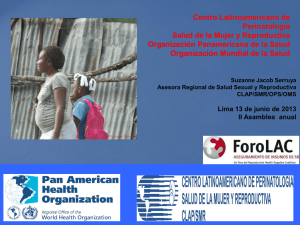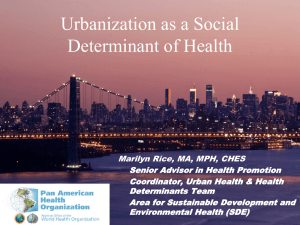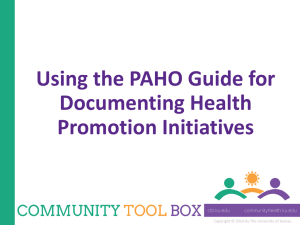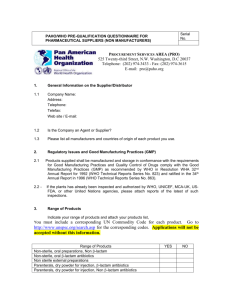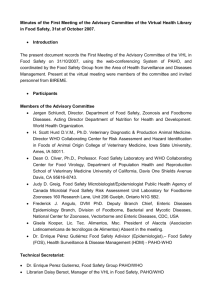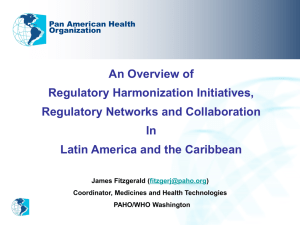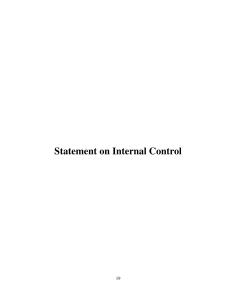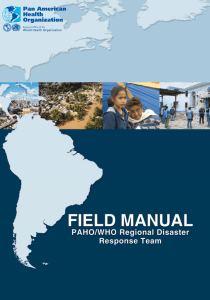The Edmundo ELIGIBILITY CRITERIA APPLICATION PROCEDURES
advertisement
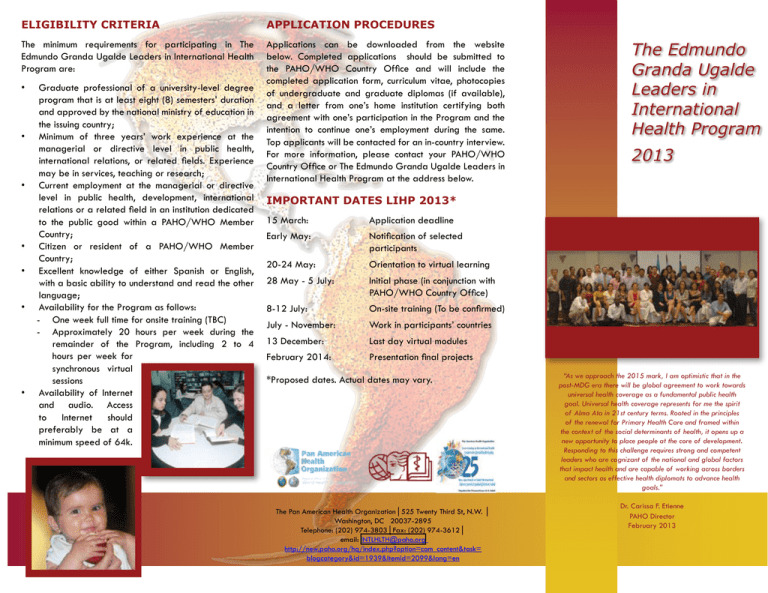
ELIGIBILITY CRITERIA APPLICATION PROCEDURES The minimum requirements for participating in The Edmundo Granda Ugalde Leaders in International Health Program are: Applications can be downloaded from the website below. Completed applications should be submitted to the PAHO/WHO Country Office and will include the completed application form, curriculum vitae, photocopies of undergraduate and graduate diplomas (if available), and a letter from one’s home institution certifying both agreement with one’s participation in the Program and the intention to continue one’s employment during the same. Top applicants will be contacted for an in-country interview. For more information, please contact your PAHO/WHO Country Office or The Edmundo Granda Ugalde Leaders in International Health Program at the address below. • • • • • • • Graduate professional of a university-level degree program that is at least eight (8) semesters’ duration and approved by the national ministry of education in the issuing country; Minimum of three years’ work experience at the managerial or directive level in public health, international relations, or related fields. Experience may be in services, teaching or research; Current employment at the managerial or directive level in public health, development, international relations or a related field in an institution dedicated to the public good within a PAHO/WHO Member Country; Citizen or resident of a PAHO/WHO Member Country; Excellent knowledge of either Spanish or English, with a basic ability to understand and read the other language; Availability for the Program as follows: - One week full time for onsite training (TBC) - Approximately 20 hours per week during the remainder of the Program, including 2 to 4 hours per week for synchronous virtual sessions Availability of Internet and audio. Access to Internet should preferably be at a minimum speed of 64k. The Edmundo Granda Ugalde Leaders in International Health Program 2013 IMPORTANT DATES LIHP 2013* 15 March: Application deadline Early May: Notification of selected participants 20-24 May: Orientation to virtual learning 28 May - 5 July: Initial phase (in conjunction with PAHO/WHO Country Office) 8-12 July: On-site training (To be confirmed) July - November: Work in participants’ countries 13 December: Last day virtual modules February 2014: Presentation final projects *Proposed dates. Actual dates may vary. The Pan American Health Organization│525 Twenty Third St, N.W. │ Washington, DC 20037-2895 Telephone: (202) 974-3803│Fax: (202) 974-3612│ email: INTLHLTH@paho.org http://new.paho.org/hq/index.php?option=com_content&task= blogcategory&id=1939&Itemid=2099&lang=en “As we approach the 2015 mark, I am optimistic that in the post-MDG era there will be global agreement to work towards universal health coverage as a fundamental public health goal. Universal health coverage represents for me the spirit of Alma Ata in 21st century terms. Rooted in the principles of the renewal for Primary Health Care and framed within the context of the social determinants of health, it opens up a new opportunity to place people at the core of development. Responding to this challenge requires strong and competent leaders who are cognizant of the national and global factors that impact health and are capable of working across borders and sectors as effective health diplomats to advance health goals.” Dr. Carissa F. Etienne PAHO Director February 2013 A CHANGING GLOBAL CONTEXT The Pan American Health Organization (PAHO/ WHO) recognizes that health systems of the 21st century must confront new challenges to achieve national and international health goals in the face of a globalized world. The Health Agenda for the Americas 2008-2017, launched in 2007 by the ministries and health secretariats of the region, as well as the Millennium Development Goals, establish an ambitious set of priorities and commitments that require intersectoral and international action for their equitable and collective achievement. The right to health, human security in health, the introduction of new technologies, the opening of borders to trade, the growing migration of populations, and the expansion of regional and subregional integration processes have created new and urgent demands on States. Health leaders are increasingly required to formulate and implement actions that take into account bilateral and multilateral treaties and agreements and to comply with regional and global mandates in an environment comprised of new actors, alliances, and structures. Leaders must have a solid understanding of the social determinants of health and be able to act across sectors and borders to achieve balance between economic growth, social development and the right to health and to develop public policies that confront these challenges while contributing to greater global equity. PREPARING LEADERS TO MEET EVOLVING HEALTH CHALLENGES This scenario requires the training of human resources – in public health and international relations, as well as in other fields – so that they are not only technically prepared, but also have a more profound understanding of international forces and their impact on health, enabling them to effectively analyze, define, advocate and project their national health interests within this complex global context. The Edmundo Granda Ugalde Leaders in International Health Program (LIHP) aims to contribute to the development of the Health Agenda for the Americas 2008-2017 by strengthening the capacity of countries in the region to understand, act upon and positively influence the international determinants of health, to promote their national interests, and to achieve intersectoral health agreements in international environments, at all times guided by the principle of greater global equity in health. NEW CHALLENGES – NEW FOCUSES The LIHP incorporates an updated curriculum, problembased learning modules, and a decentralized operating model to enhance participants’ abilities to integrate the learning into their countries’ contexts. The LIHP is based within PAHO’s Virtual Campus for Public Health, a virtual space that contributes to the development of the public health workforce through sharing learning resources and creation of networks. Through its problem-based learning strategy, the Program utilizes a variety of virtual and practical experiences through which the participants analyze the principal concepts, theories, actors, forces, and processes related to the field and practice of international health. Among the topics covered are: nutrition and food security, migration, border health, processes of conflict and peace, disasters, climate change, access to medicines, chronic diseases, and risk surveillance and protection. Through the Program, participants develop competencies needed to fulfill the following six essential functions as they relate to international health: situation analysis, policy design and decision-making, negotiation and advocacy, project management and cooperation, generation and dissemination of knowledge, and communication. THE EDMUNDO GRANDA UGALDE LEADERS IN INTERNATIONAL HEALTH PROGRAM The LIHP encompasses eight months, launching in the participant’s country under the guidance of the Program Coordination and the PAHO/WHO Country Office. During this initial phase, participants engage in different activities, discussions and visits related to the principal health and development challenges facing the country and the region as well as the main actors involved in the same, and begin to define a project to be developed later in-country in coordination with PAHO/WHO, government and other authorities. Participants subsequently attend a one-week intensive training in international health that is projected to take place in a country of the region, after which they return to their countries where they can continue to function in their normal employment capacity on a parttime basis, while devoting approximately 50% of their working hours to the Program. Participants maintain close ties with the PAHO/WHO Country Office, allowing them to experience the technical as well as the diplomatic and political dimensions of international cooperation. They engage in a program of work and learning opportunities involving PAHO/WHO and other relevant local actors in international health, including country-based offices of the United Nations and other multilateral and bilateral agencies, sub-regional entities, non-governmental organizations and academic institutions. These experiencies are reinforced through a series of problem-based virtual modules, fomenting a community of practice that reaches beyond the participants themselves. The Program culminates in February 2014 with the presentation of the final projects. BENEFITS PAHO will cover the cost for the implementation of the virtual components of the Program. The one week on-site module is contingent upon the identification of additional resources.
